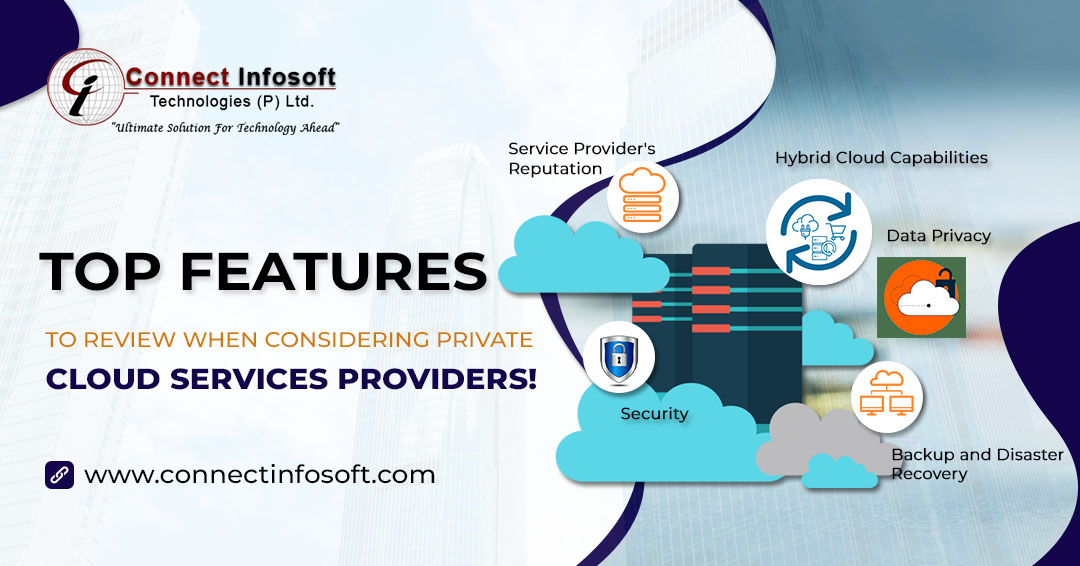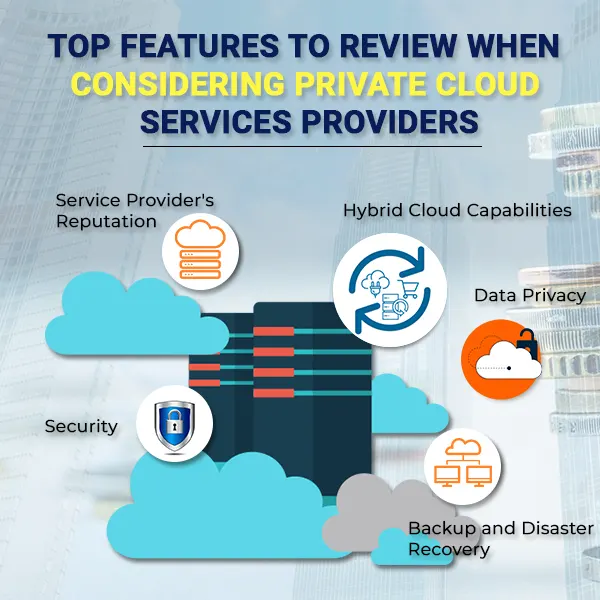Top Features To Review When Considering Private Cloud Services Providers | Connect Infosoft

Because enterprises only pay for the resources they consume, using cloud services allows companies to move faster on initiatives and test out concepts without protracted procurement and large upfront expenses. This concept of corporate agility is frequently emphasised as a key benefit by cloud enthusiasts. The ability to spin up new services without the cost and effort involved with traditional IT procurement should make it easier to get new applications up and running more quickly.
When considering private cloud service providers, it's essential to evaluate various features to ensure they align with your organization's requirements and goals.
Here Are Some Top Features To Review:
- Scalability and Performance: Ensure the provider's infrastructure can handle your organization's current and future demands. Look for features like auto-scaling, load balancing and high-performance computing capabilities.
- Security: Security is paramount for private clouds. Evaluate the provider's security measures, including data encryption, access controls, firewalls, intrusion detection and regular security audits.
- Compliance: If your organization operates in a regulated industry, check if the provider complies with relevant standards such as GDPR, HIPAA, PCI DSS, etc.
- Data Privacy: Understand how the provider handles and protects your data. Check their data retention policies, backup procedures and data sovereignty options.
- Customization: A private cloud should be tailored to your organization's needs. Assess if the provider allows customization of resources, networking and configurations.
- Hybrid Cloud Capabilities: If you plan to adopt a hybrid cloud strategy, ensure the provider supports seamless integration between your private cloud and public cloud services.
- Network Connectivity: A reliable and low-latency network is vital for private cloud services. Evaluate the provider's network infrastructure and available options for dedicated connections.
- Backup and Disaster Recovery: Check the provider's backup and disaster recovery strategies. They should have robust mechanisms to ensure data integrity and availability during unforeseen events.
- Service Provider's Reputation: Research the provider's reputation in the industry. Look for reviews, case studies and customer testimonials to gauge their track record.
- Comprehensive Documentation: Good documentation is a sign of a well-organized provider. Check if they offer clear and comprehensive guides for setup, management and troubleshooting.
- Legal and Contractual Terms: Review the terms of service, data ownership, exit strategies and any potential legal implications of working with the provider.
What Is Private Cloud Services?
Private cloud services refer to computing resources, services and infrastructure that are dedicated to a single organization and are hosted either on-premises or by a third-party provider. Unlike public clouds, which are shared among multiple users and organizations, private clouds offer exclusive use to a single entity, ensuring greater control, security and customization.
Benefits Of Private Cloud Services:
Private cloud services offer several benefits that make them an attractive choice for organizations. Here are some of the key benefits:
- Enhanced Security: One of the primary advantages of private cloud services is the increased level of security they provide. With a private cloud, your data and applications are stored on dedicated infrastructure that is not shared with other organizations. This isolation helps reduce the risk of unauthorized access and potential security breaches.
- Increased Control and Customization: Private clouds offer greater control and customization options compared to public cloud services. You have the ability to tailor the infrastructure, network configurations, security policies, and deployment models to meet your specific requirements. This level of control allows for better alignment with your organization's security, compliance, and performance needs.
- Hybrid Cloud and Legacy System Integration: Private clouds facilitate hybrid cloud deployments, allowing you to integrate and extend your existing on-premises infrastructure with cloud resources. This integration enables seamless migration, workload portability and hybrid deployments, which can be beneficial for organizations with legacy systems or specific data requirements.
- Cost Efficiency and ROI: While private cloud services may require higher upfront capital investment compared to public clouds, they can provide cost efficiency and a better return on investment (ROI) in the long run. Private clouds can help optimize resource utilization, reduce unnecessary costs and avoid the risk of unexpected charges associated with public cloud services.
- Business Agility and Innovation: Private clouds enable organizations to rapidly deploy and scale applications and services, leading to increased business agility. The dedicated infrastructure and control over the environment allow for faster innovation, experimentation and the adoption of emerging technologies that can drive business growth and competitive advantage.
Challenges Of Private Clouds Services:
While private cloud services offer various benefits, they also come with certain challenges that organizations should be aware of. Here are some of the common challenges associated with private cloud services:
- Higher Initial Costs: Setting up a private cloud infrastructure can involve higher upfront costs for hardware, software and personnel.
- Maintenance and Management: Private clouds require ongoing maintenance, updates, and management, which can demand skilled IT personnel.
- Limited Scalability: Private clouds may not provide the same level of scalability as public clouds, which can limit their suitability for certain rapidly changing workloads.
- Potential Underutilization: Without careful planning and resource allocation, there's a risk of resources being underutilized, leading to inefficiencies.
Key Characteristics Of Private Cloud Services Include:
- Dedicated Resources: Private cloud services provide dedicated computing resources, including virtual machines, storage and networking components, solely for the use of the organization that owns the private cloud.
- Isolation: The infrastructure of a private cloud is isolated from external users and organizations, ensuring that data and applications are kept separate and secure.
- Control: Organizations have complete control over the private cloud environment, allowing them to manage and monitor resources, implement updates and adjust configurations as needed.
- Predictable Performance: Private clouds provide consistent and predictable performance since resources are not shared with other users. This makes them suitable for applications with stringent performance requirements.
- Hybrid Integration: Private clouds can be integrated with public cloud resources in a hybrid cloud architecture, enabling organizations to leverage the scalability of public clouds while keeping sensitive data and critical workloads within their private environment.
Private Cloud Services Can Be Hosted And Managed In Different Ways:
- On-Premises Private Cloud: Organizations build and manage their private cloud infrastructure within their own data centers. This provides the highest level of control but requires significant upfront investment and ongoing maintenance.
- Hosted Private Cloud: Organizations can choose to have a third-party provider manage the private cloud infrastructure off-site. This reduces the burden of infrastructure management while still offering customization and security benefits.
- Managed Private Cloud: Similar to hosted private clouds, managed private clouds are maintained by a third-party provider, but the provider takes care of ongoing management, updates and maintenance tasks.
Conclusion:
In conclusion, private cloud services offer a dedicated and secure computing environment exclusively for a single organization's use. These services provide a range of benefits, including enhanced security, customization, control and predictable performance. Organizations can choose between on-premises private clouds, hosted private clouds, or managed private clouds to best meet their needs.
Private clouds are ideal for industries with strict compliance regulations, organizations needing data sovereignty control, and those with applications requiring consistent performance. While private clouds offer greater control, they come with higher initial costs, maintenance responsibilities and potentially limited scalability compared to public clouds.


